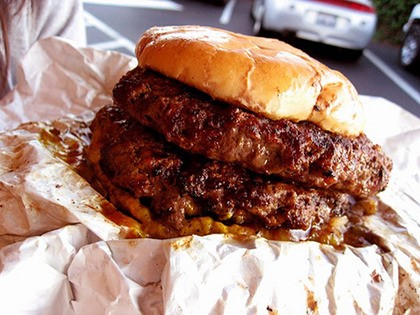Scientists have long warned that some of our modern-day eating habits are not only harmful to our personal health but also to the planet. Especially our preference for animal food products like meat and dairy causes more environmental damage than most consumers are aware of.
A recent study from France tried to calculate more accurately the real costs of our food consumption on both individual as well as global levels, and the results are not comforting.
Foods with the comparatively lowest nutritional value may be the cheapest to buy but are the costliest in terms of production and environmental impact, the study found. High meat consumption in particular contributes to weight problems and a number of related diseases, and is also responsible for greenhouse gas emissions, deforestation, wasteful water use, and other depletion of natural resources, the researchers said.
“The food system accounts for approximately one-third of global greenhouse gas emissions, and global obesity is on the rise,” Dr. Gabriel Masset, a researcher at Aix-Marseille University in Marseille, France, and lead author of the study report told Reuters.
What must be done to make both our food production and consumption healthier and more sustainable for the long term is to focus on foods that offer higher nutritional value at lower cost and with a smaller environmental footprint, the study concluded.
But we also need a sea change in consumer behavior. Animal food products are the toughest on the environment. Growing fruits and vegetables is far less intrusive but can be labor intensive and therefore pricey. Processed foods, both animal- and plant-based, are much cheaper by comparison but can be unhealthy and are considered to be among the leading causes of the global obesity crisis.
Less meat is great
Reducing meat consumption alone will not solve the myriad of environmental problems we are facing today. Nor will it reverse our diet and lifestyle-related disease epidemic. But it can be one of many measures we can take to lead us in the right direction.
“The fact is, most people in the U.S. eat way more meat than is good for them or the planet, but even knowing this, the chances are little that we are all going to become vegetarians, much less vegans,” said Mario Batali, a celebrity chef and restaurateur. “But we can focus on a more plant-based diet and support the farmers who raise their animals humanely and sustainably,” he added.
To put his money where his mouth is, Batali pledged a commitment to a “Meatless Monday” policy in his establishments and lent his support for the “Meat Eater’s Guide to Climate Change & Health” (EWG), an environmental health research and advocacy organization.
Food choices are a highly personal matter. Most people don’t like to be told they are doing something wrong by eating what they want. That’s understandable. But knowing the real impact and cost, both tangible and intangible, our behavior causes, should be in everybody’s interest.
Fortunately, even on an individual level, we are not completely helpless. As consumers, our actions matter greatly to the respective industries, and they will listen. Already there is a growing public interest in the integrity of our food sources. If that concern for our personal wellbeing expands to greater care for the environment we all live in, progress will be inevitable – and the sooner we get there, the better.
Timi Gustafson R.D. is a registered dietitian, newspaper columnist, blogger and author of the book “The Healthy Diner – How to Eat Right and Still Have Fun”®, which is available on her blog and at amazon.com. For more articles on nutrition, health and lifestyle, visit her blog, “Food and Health with Timi Gustafson R.D.” (www.timigustafson.com). You can follow Timi on Twitter, on Facebook, Google+ and on Pinterest.


